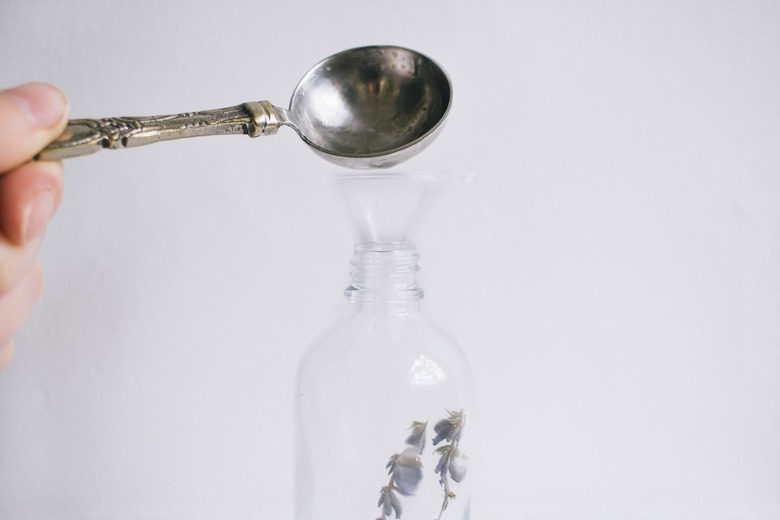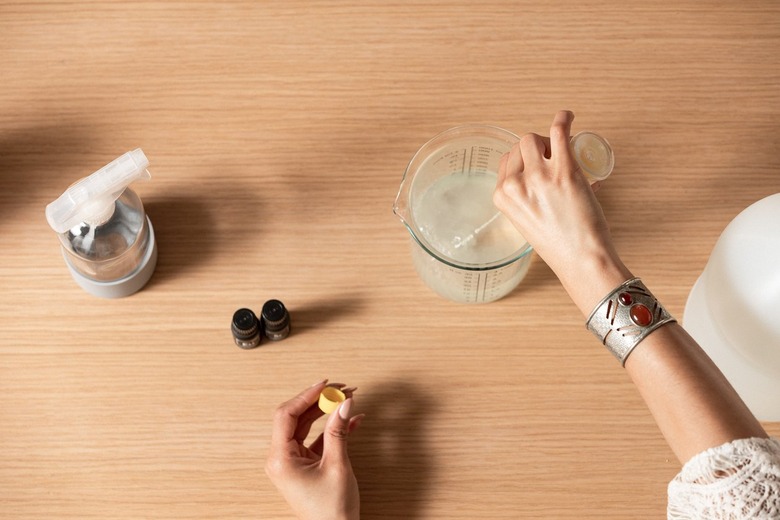8 DIY Bug Sprays And Repellents That Will Keep The Bugs At Bay
We may receive a commission on purchases made from links.
Want pesky bugs to leave you alone, but don't want to use commercial bug sprays containing DEET? Though bugs are bound to cross your path when you spend time outside, there are plenty of homemade bug spray recipes that can help you repel mosquitoes around your body, your home, and your plants.
Ready to enjoy your backyard or patio sans buzzing and bites? Give these eight homemade bug spray and repellent recipes a try.
A Disclaimer About Natural Bug Sprays
A Disclaimer About Natural Bug Sprays
Neither the Environmental Protection Agency nor the United States Food and Drug Administration regulates the purity or effectiveness of essential oils, which is why you should not use a homemade natural bug spray if you are in an area where mosquitoes are known to spread dangerous diseases, such as Zika, West Nile, or dengue virus.
However, the Centers for Disease Control and Prevention says that natural mosquito repellents containing oil of lemon eucalyptus may be just as effective as formulations containing DEET. These products are regulated by the Environmental Protection Agency and will help you avoid using DEET while still staying safe from disease. It is also important to note that "lemon eucalyptus essential oil" is not the same as "oil of lemon eucalyptus" (which is not an essential oil and is not available for purchase by consumers), so you should not attempt to make your own lemon eucalyptus bug spray at home.
When using a natural alternative, remember to only use products approved for topical application on your body in order to avoid irritation. Always put any products containing essential oils in glass spray bottles because essential oils can cause plastic to deteriorate. Plan on reapplying any DIY bug spray made with essential oils as often as every 20 minutes — because while the products used in homemade insect repellent may smell good and be free of dangerous synthetic pesticides, essential oils evaporate very quickly and thus lose their effectiveness.
1. Lavender Essential Oil Mosquito Spray
1. Lavender Essential Oil Mosquito Spray
This simple lavender essential oil spray is an effective mosquito repellent that is considered safe for topical use, and it will make you smell fantastic while also relaxing your nerves. Best of all, unlike many other essential oils, lavender essential oil can be safely used on your skin without being diluted in a carrier oil first.
To make it, simply combine one part lavender essential oil with 10 parts witch hazel and pour it into a glass spray bottle. Shake gently and spray liberally on your skin. You can also enhance the effectiveness and smell of this product by adding one part pure vanilla extract to the mix.
2. Herbal Clothing Spray
2. Herbal Clothing Spray
If you don't have any essential oils on hand, try this homemade bug spray recipe that uses fresh herbs to create a spray that can be applied to clothing to repel bugs, including mosquitoes, spiders, flies, fleas, mites, and ants. Start by making a tea with 1 cup boiling water, two clove buds, 1/2 teaspoon dried peppermint, 1/2 teaspoon dried catnip, and 1/2 teaspoon dried lavender. If using fresh herbs, chop them finely and use 1/2 tablespoon instead of 1/2 teaspoon. Let your insect-repelling tea steep until the water is cool. Strain out the herbs and mix with 1 cup witch hazel or rubbing alcohol.
3. Natural Bug Balm
3. Natural Bug Balm
Some people find balms easier to use than sprays because they can get an even application across all of their skin. If you prefer a balm over a spray, then try this great bug-repellent recipe for a balm that smells great and is nourishing on the skin. This skin-soothing creation should help protect you from mosquitoes, fleas, ticks, gnats, flies, bedbugs, chiggers, fruit flies, and mites.
Tip
It's best to use a dedicated double boiler or a dedicated glass jar placed inside boiling water for this type of project, as these products can burn easily, and it is very hard to remove all the wax after you are finished.
Start by melting together 6 ounces of unrefined coconut oil, 2 ounces of shea butter, and 1.5 ounces of beeswax on low heat. At the same time, combine 30 drops of citronella essential oil with 25 drops each of lemongrass, cedarwood, and lavender essential oils in a bowl. When the first ingredients are melted together entirely, stir in the oils and then pour it into a glass or metal storage container. The balm cools down and hardens quickly, so put it in its storage container as soon as it is fully blended. Apply it like a lotion, rubbing it on any exposed skin.
4. Citronella and Lavender Yard Spray
4. Citronella and Lavender Yard Spray
Citronella may cause skin irritation or an allergic reaction for some people, which is why it's typically best to avoid using it as a topical product. However, it is well-known for being an effective mosquito repellent, and studies indicate that it is also effective at repelling fleas, gnats, aphids, flies, mites, and kissing bugs. If you want to move beyond citronella candles, try combining the mosquito-repelling powers of citronella with those of lavender, which, bonus, will also make your space smell wonderful.
Combine 20 drops of lavender essential oil, 20 drops of citronella essential oil, 2 ounces of distilled water, and 2 ounces of white vinegar in a glass spray bottle. Shake gently and spray it around the area where you plan to spend time outdoors.
5. Garlic, Dill, and Lemon Home Spray
5. Garlic, Dill, and Lemon Home Spray
Do you want to keep bugs like mosquitoes, ticks, ants, fleas, spiders, cockroaches, and flies from coming into your home and yard? Try using this garlic, dill, and lemon spray with a pungent but appealing smell.
Start by placing three crushed garlic cloves and four sprigs of dill in 1 cup of warmed mineral oil. Let it sit overnight and then add 2 tablespoons of lemon juice and a cup of water. Pour it into a spray bottle and shake well to combine the water and oil before spraying along the entryways to your home and along the edges of your patio.
6. Thyme Essential Oil Garden Spray
6. Thyme Essential Oil Garden Spray
Thyme essential oil is not typically considered safe for use on skin unless it is substantially diluted with a carrier oil, like vegetable glycerin, which may reduce the herb's notable effectiveness in repelling insects. Thyme is a great product for keeping bugs (including mosquitoes, cabbage loopers, tomato hornworms, and corn earworms) off your plants because it will not harm them like other natural bug-repelling herbs, like cinnamon.
To make, fill a glass spray bottle with 20 drops of thyme essential oil and 2 cups of distilled water. Shake gently and then spray lightly on the leaves and stems of your plants.
7. Soap-Based Garden Insecticide
7. Soap-Based Garden Insecticide
Different pests call for specific pesticides, so if your garden has been infested with aphids, thrips, mealybugs, scale insects, or whiteflies, try combining 1/2 cup of rubbing alcohol and 1 quart of unscented Castile soap in a spray bottle. Shake well before applying it directly on the leaves, stems, buds, and flowers of your plants. Allow it to sit for 20 minutes before washing well with water. For best results, do this at dawn or dusk because direct sunlight can burn the leaves while they have the solution on them. Repeat the process every three days until you see that the pesky bugs are eradicated.
8. Tomato Leaf Bug Killer
8. Tomato Leaf Bug Killer
Some bugs can't get enough of tomato leaves (tomato hornworms are a good example), but these leaves contain compounds that are not only toxic to humans but also certain insects, including earworms, maggots, and many beetles. To keep pests off your other plants, harness the power of the tomato leaves by soaking 2 cups of chopped tomato leaves overnight in a pint of water. Remove the leaves the next day and then add another pint of water and 1/4 teaspoon unscented Castile soap. Pour the mixture into a spray bottle and apply it to plants and their surrounding soil as needed. If used on edible plants, be sure to wash them well before eating.


